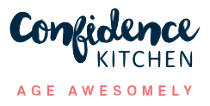My story: From genetically high cholesterol to heart health
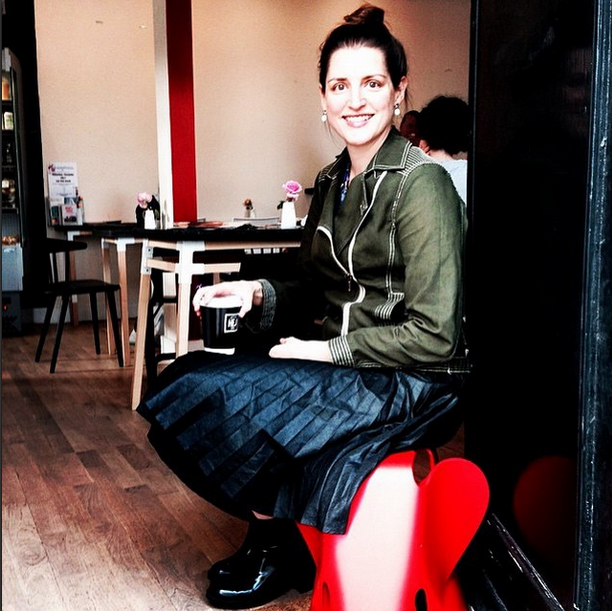
I was diagnosed with Familial hypercholesterolemia, and despite 3 doctors telling me I would need to go on statin drugs for the rest of my life to lower my cholesterol, I went online, and instead found hundreds of credible resources that I compiled to create my own natural, drug-free, cholesterol reducing diet. At my last checkin with my NHS lipid specialist she said, “I could not believe your LDL levels when I saw them”, ”I don’t know how this happened” and “this does not happen without drugs usually”. So…how did this happen?
In the middle of 2011, it was discovered at a routine blood test, that I had strangely high cholesterol for my age and gender. When my doctor did a further dig into this issue (thinking it was an error), my records also revealed that previous blood tests had shown elevated cholesterol but due to my age it had not really been brought to my attention.
The first doctor prescribes statins for life
My GP noticed the warning this time, and told me that I needed to address my dangerously high cholesterol immediately with Statin drugs to bring it down to acceptable levels. I knew relatively little about cholesterol except what I’d gleaned from the continuous drubbing the media doles out on an almost daily basis about the dangers of high cholesterol foods. I was aware that heart disease and cholesterol medication were pretty standard in my family, but generally for those over 50, not someone in their 30s. This diagnosis seemed bizarre! Perhaps this is wrong, I thought. I was a generally healthy eater, and while I could stand to lose a few pounds, I was certainly not obese or even fat by any stretch.
So due to my relatively young age and decent level of physical fitness, the GP sent me back for a retest.
I went home and started urgently reading up on cholesterol, heart disease and statin use that same day. I found oodles of articles on the side effects of these statin drugs that I was being recommended to take.
Hmmmm, I pondered, this Statin thing does not seem all that apealing or even useful in getting my heart healthy! I found hundreds of credible sources showing that Statin use was dubiously helpful at best, and harmful at worst. What is going on here, I wondered? Why is every doctor I talk to trying to get me to take these things, when there is credible research showing that they don’t even work? I found a lot of information online about treating high cholesterol with natural, drug free, lifestyle solutions. I decided to take this lifestyle based evidence to another doctor.
The second doctor prescribes statins for life
So I take my online research, and go to receive the news of my blood re-test, this time with doctor number 2. A big part of me was thinking that the test would come back at a more normal level. Unexpectedly though, the test came back with an even higher number: 352 mg/dl (9.1 mmol/L) of total cholesterol! Not good.
This second GP stuck to the party line. He said that with my family history I would need to go on Statins for the rest of my life to manage it. I was urged to get started on the statins asap since it would be several months before I would be able to get an appointment with a lipid specialist who could confirm what the source issue was.
Fresh from my research I pushed back hard on almost every point he made about needing to go on statins. It was quite an odd, combative visit, but I was convinced that lifestyle options were the way to go and was truly curious as to why I was being told to go on statins. He seemed flustered with my barrage of questions, but had to stick to the government guidelines which suggested that it was crucial for me to get on the Statins asap. While I couldn’t really get a clear answer that refuted my online research, the thing I could not argue with was the extreme nature of my cholesterol levels – it looked like I may have a genetic problem. That, and the suggestion that I could not put off taking drugs even a few months until the lipid specialist appointment really scared me.
Will I have a heart attack in between then and now?
When weighing up his decision about whether it might be ok for me to try lifestyle issues first instead of statins he asked me “hmmm, well some of your family members died fairly young from a heart attack, so I wouldn’t wait too long.” Yikes. I declined the drugs but I was really frightened, and was wondering if I was making the right decision to hold off on drugs for the time being.
In a positive turn of events, I was surprised when this second doctor phoned me up later that day after my in-office visit. I think my push back must have made him question his “drugs-only” recommendation. He said he’d talked to his colleagues to get their perspective and that he “was happy for me to try lifestyle options for 6 weeks.”
This gave me a glimmer of hope I might find a side-effect free, natural treatment to reduce cholesterol and so I started my adventures in living a heart healthy lifestyle.
The third doctor (the lipid specialist), prescribes statins for life
Eventually the day to visit the lipid specialist arrived, and I was excited to discuss the latest research I had been reading in order to finally get an expert’s opinion on the role of drugs vs. lifestyle in dealing with extremely high cholesterol.
What happened was entirely different to my expectation. Instead, I was examined, had a history taken, and then saw my last few blood tests being reviewed. I was diagnosed with a genetic condition called familiar hypercholesterolaemia and again told my cholesterol levels were dangerously high, and that drugs were required to get them under control.
What about lifestyle options, I asked? It was explained that people with this condition could use lifestyle options to help in a small way, however the bulk of the heavy lifting to stay healthy would need to be done with statin drugs! Due to the reductionist nature of modern medicine, there seemed to be no holistic food plan that could be offered to patients. When asked, some individual statistics were provided to me to answer my questions about the benefits of red wine, exercise and olive oil etc., (things that I now know are part of the portfolio and poly-meal diets), however these things were all presented as providing only very small shifts in the needle. There seemed to be very little research indicating what would happen if one were to specifically eat in a very focussed way with the target being improved lipid test results.
Another thing that disturbed me from this third doctor visit, was that if I had not asked, I really don’t think there would have been any food recommendations at all outside of: “reduce your salt, switch to a cholesterol reducing margine like Benecol, and reduce your saturated fat intake!” I now know that these are nowhere close to the main keys to getting your heart healthy anyways!
It was shocking to me after what I had found through my own basic internet research prior to my specialist visit, that no literature / handout / verbal plan was provided on what I should be eating. They were pretty much offering me an all-drug solution, side-effects be damned.
Food did not seem to be a big tool in the cholesterol reduction toolkit. To the NHS it appears to be a side player. I suppose I should not have been surprised considering that the posters on “healthy heart eating” in the NHS waiting room were laughable. Still, I was disappointed. I thought I was going to get guidance on what to ingest to help heal myself, but instead drugs were offered as the primary solution. Now I felt all alone in my quest to find a way to lower my cholesterol naturally.
My “before” cholesterol and my “after” targets
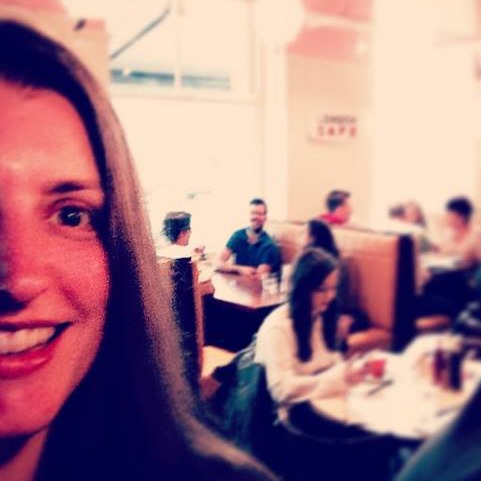 After my third doctor’s visit, I realised I was going to have to figure this out myself and create a heart-healthy diet and eating plan to try to cut my cholesterol level by almost half. My total cholesterol serum levels were 352 mg/dl (9.1 mmol/L) and LDL was at 264 mg/dl (6.82 mmol/L). A Mayo clinic target for total cholesterol serum level was 200 mg/dl or less for a normal person (and with my family history I was not considered normal), but as a first point of reference, I set myself the target of getting my total cholesterol below 200mg. This meant I had to reduce my total cholesterol by almost half: a -43% drop was in order.
After my third doctor’s visit, I realised I was going to have to figure this out myself and create a heart-healthy diet and eating plan to try to cut my cholesterol level by almost half. My total cholesterol serum levels were 352 mg/dl (9.1 mmol/L) and LDL was at 264 mg/dl (6.82 mmol/L). A Mayo clinic target for total cholesterol serum level was 200 mg/dl or less for a normal person (and with my family history I was not considered normal), but as a first point of reference, I set myself the target of getting my total cholesterol below 200mg. This meant I had to reduce my total cholesterol by almost half: a -43% drop was in order.
I was open to the idea of taking Statins if I could not find other proven ways of getting my health back in order, however the family members on one side of my family has generally dropped like flies, and many from heart disease, so I thought maybe this was genetics catching up to me. That said, I thought it made sense to try lifestyle options for a few months and defer the statins decision until I had satisfied myself that this approach did or did not work.
How I reduced my cholesterol without statins
(NOTE: If you want the shortcut shopping lists then click here for what to eat to lower cholesterol naturally.)
I left the doctor’s office and went home to continue my research. I was struck by the amount of information available online. It was overwhelming. I started looking for information sources that supported each other, and began eating the things that showed up on multiple websites or in multiple research studies. It was recommended to eat more:
- oily fish
- Omega 3’s
- oatmeal
- blueberries
- nuts of all kinds, particularly almonds and walnuts
I did all of these things and much more. I researched and then ate every different food I could find that had some support for lowering cholesterol. These included things like:
- cinnamon
- turmeric
- raw garlic
- red wine
- seaweed
- flax
- hemp
- pearl barley
- vegetables and fruits
- green smoothies
- low GI grains like quinoa
- beans
I learned that sugar and white flour consumption were worse for heart disease than fat consumption. I cut out sugar and white flour, rice, potatoes and anything that was processed or contained trans-fat.
Results of my cholesterol lowering diet
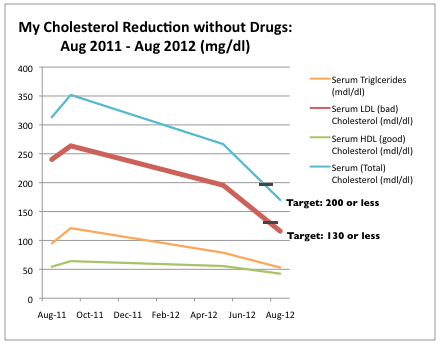
My LDL cholesterol reduction without drugs, was nothing short of a miracle for the UK medical establishment
I’m Canadian but live in London, so I give you the results using both the UK (mmol/L) metrics as well as the N. American ones (mg/dl). My body responded to the changes in diet fairly instantly and continuously. The first downward slope was mostly salmon, oatmeal, psyllium husks, and Omega 3’s. The 2nd steeper decline, was when I continued with the salmon/oatmeal etc., but then I realized the importance of vegetables in the whole scheme of cholesterol reduction, and started adding green smoothies to my daily routine, as well as eating a significantly higher amount of vegetables and fruits at every meal. It’s taken 1 year, but it’s clear there was a consistent impact from the time that I started making the dietary changes. I realise that I am only a sample of 1, however I join a pool of patients whose success stories support the amazing “alternative” health professionals and doctors who are pioneering this drug free approach to heart health. I wholeheartedly believe that this approach will in 20 years, be the “standard way” we approach heart disease.
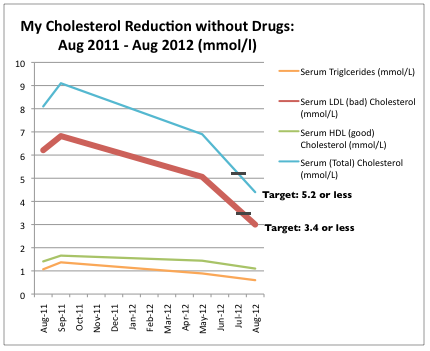
Same results as above, using the UK metric standard (mmol/L)
Why isn’t everyone avoiding statins and eating the right foods to lower cholesterol naturally?
While this information is publicly available, it’s not mainstream yet. Most people still mistakenly believe that heart health is a family/genetic thing, or something that comes about as an inevitable part of ageing. Neither are true. Most people over 40 have high cholesterol these days, and it’s because they’re not aware of how to eat in a way that effectively could deal with it. Food can easily be the primary “drug” that you can use to reduce your cholesterol.
I am very happy to report that after 1 year since my extremely bad cholesterol tests, I have brought my cholesterol levels back down into the “normal” range

Relaxation and stress reduction are one of several keys to lowering cholesterol naturally
I normalised my cholesterol with just diet (not really much exercise – although that will have to start now, as it’s critical for long term health management). I remind you that my 3 doctors said that “this could not be done without drugs.”
“I’ve come to realize that in general, the majority of doctors are not clear on how to effectively treat cholesterol via effective and side-effect free, natural diet solutions, and so they are prescribing the only method they know: harmful Statin drugs.”
It’s critical that you take your health in your own hands and not just put a “Statin bandaid” over the problem, without tackling the root causes of improper eating, systemic inflammation, vitamin deficiency, gluten intolerance, and sugar misuse among many others. I welcome the opportunity to provide you with the information you need to find your own natural solutions that tackle the root cause of heart disease, rather than merely focussing on cholesterol reduction, which is not the critical piece of the puzzle when it comes to a healthy heart and immune system.
You too can reduce your cholesterol with food!
If your cholesterol is currently high, don’t be scared or feel you have to jump onto Statins! There are a very select few people that may need them, but in general, about 95 – 99% of the population really does not benefit from Statins. Beyond the heart benefits that you will get from eating for overall heart and immune health, as you slowly change your habits, you will notice an improvement in almost every aspect of your life from your skin to your outlook to your waistline to your energy! I am so glad that I had high cholesterol as it has changed my life for the better, and now I am a much happier and healthier woman who takes her health seriously and takes care of myself with every bite!
I salute you as you begin your journey to better and better health! I raise my heart healthy glass of red wine to my lips and say “Here’s to your radiant health!”
—
Laura Livesey
The Confidence Kitchen
P.S. Please know that for a small group of people, especially those with genetic familial hypercholesterolemia, you can do everything right on the lifestyle side, and still require statins. I notice that sometimes people see this as a “failure” if they must then take statin drugs. This is not the case. Do your absolute best with the tools you have. First, make sure you use fiber, phytochemicals, protein healthy fats, movement and resistance training to feed your gut, eliminate glucose spikes, switch on your genetic healing pathways and give yourself the best chance of healing your body (and I mean – really commit and take an extreme approach to it!) Everyone’s body is different. At that point if you have done everything in your power and you still need statins, then you must embrace the tools available to you, and work with your healthcare professional to use the tools that will enhance your longevity.
MEDICAL DISCLAIMER
This content is for informational and educational purposes only. It is not intended to provide medical advice or to take the place of such advice or treatment from a personal physician. All readers/viewers of this content are advised to consult their doctors, nutritionists and/or qualified health professionals regarding specific health questions. All viewers of this content, especially those taking prescription or over-the-counter medications, should consult their physicians before beginning any nutrition, supplement or lifestyle program.
